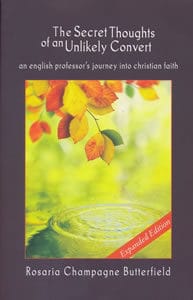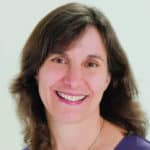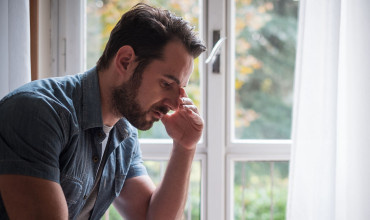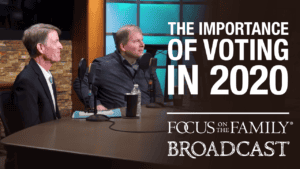Opening:
Teaser:
Dr. Rosaria Champagne Butterfield: I wanted this Bible to be mine. I didn’t understand how. I didn’t understand how in the world that would be mine. I wanted that yoke that was easy and this burden that was light. I wanted this capacious God. I didn’t want my flesh to be screaming about things that God didn’t love. I really wanted that and that was shocking to me.
End of Teaser
John Fuller: Dr. Rosaria Butterfield sharing just a bit of her incredible story of what she calls her “train wreck” of a conversation to Christ and you’ll hear a lot more from her on today’s “Focus on the Family” with Jim Daly. Thanks for listening in today. I’m John Fuller.
Jim Daly: John, this program with Rosaria received the highest response of all of the “Focus on the Family” broadcasts we aired this entire year. And it’s amazing how many people were impacted by her story. What’s most incredible is, how far away from God Rosaria seemed to be at the time and how could someone like her ever come to know and accept Jesus Christ as her Savior?
Unfortunately, we Christians can make the mistake of judging some people as unreachable, as if God could never get ahold of their lives and transform their hearts. But Rosaria’s story proved that wrong and that’s why we want to share this with you again today. This program will challenge all of us to consider what kind of godly witness we are when we’re presenting the gospel to those outside of the faith.
John: And here’s how we started out Best of 2016 conversation with Dr. Rosaria Butterfield on today’s “Focus on the Family.”
Body:
Jim: I want to start with kind of the beginning–
Rosaria: Okay.
Jim: –where you’re coming from, kind of you as a high school, college student.
Rosaria: Oh, yeah.
Jim: What was your attitude? Where were you at? And this is before you encountered Jesus, obviously. So, let’s start right there. What kind of person were you?
Rosaria: Right, well, I was a thoughtful person. I was an intellectual. I had been raised in the Catholic church and had gone to predominantly Catholic schools. I loved the nuns. They taught me to diagram a sentence before I tried to interpret it and I personally thought that was a great life skill.
Jim: Well, and that set you up for a Ph.D. in English literature.
Rosaria: Oh, it really did. You know what? It really, really did. (Laughter) But you know, they also taught me to stand with the disempowered and to seek out the unlovely and the unloved and draw them in and so, that was very much a life value for me.
I would also say that I had a predominantly heterosexual adolescence. I did not date until college and in college I met my first boyfriend and it was a very heady experience in college. Men started to notice me and that was intriguing, but at the same time, an undercurrent of longing had inserted itself into my heart for women and it was a confusing time, as well.
So, from my college days through my graduate school days, I continued to date men and at the same time, just experience[d] a[n] overwhelming fascination and desire to be not only in the company of women, but also to be sexually in the company of women. And so, at the age of 28, I came out as a lesbian and I thought I was just simply telling the truth. I didn’t have a big agenda. I was just trying to say it like it was.
Jim: Rosaria, you know, that’s shocking. I mean, people, right now are saying, okay, this is goin’ somewhere. (Laughter) I gotta listen to this. And the thing I want to make sure people are hearing from you and I know that it’s probably uncomfortable to talk about those days because you’re a different person now—
Rosaria: Yeah.
Jim: –but it’s important for them to hear your heart in this way.
Rosaria: Right, right.
Jim: When you were teaching on the campus and you were part of kind of the women’s movement—
Rosaria: Right, oh, yeah, very much so.
Jim: –in that regard, just set that setting. There’s such angst toward Christian thought, Christian students, Christian culture.
Rosaria: Absolutely, right.
Jim: And I’d like to dig into that a bit and talk about that angst that is there. Why the hatred? Oftentimes Christians are seen as the haters, yet it feels like there’s a lot coming from the folks who are same-sex attracted. That doesn’t fit with me.
Rosaria: Right, absolutely.
Jim: It’s not the way I think about my faith and my Lord. So, talk about that environment and what you were experiencing as a teacher and as a movement leader.
Rosaria: Right, right, and it’s different today. So I was a tenured professor at Syracuse University and I was there from 1992 until, all right, I left campus in 1999 to do a research leave, but I was technically on staff there from ’92 until 2002. And that was before, you know, many of the issues, right. That was during the days of DOMA, of the Defense of Marriage Act and I, other than to say that I was very threatened by Christians.
I don’t know that I had a really well-thought-out reason, but I did teach in women’s studies and in feminist theory and in queer theory and 19th century studies. And what I would say in my classes is that, feminism was the lens through which we were going to engage these ideas.
And I would say, you know, in the same way that in your French class, you would be expected to speak in the language and work in the language. In this class, we are going to interpret the world through the language of feminism. So, that’s just a done deal. You don’t like it; go take another class.
And really, I personally didn’t see that as an angry point of view. I saw that as me being intellectually honest and you know, setting the standard for things. Now I was also a historical materialist. I did not believe in any kind of supernatural authority. I thought that was simply absurd. I thought that was anti-intellectual. And so, the name of Jesus, which truly had rolled off my tongue in a little girl’s prayer, then rolled off my back in college, really made me recoil in anger by the time I was a faculty member.
Jim: What, if you think about it, given that, what caused that anger? What was driving that anger?
Rosaria: One of the things that caused that anger, that I really did not understand why Christians would not leave consenting adults alone. That did not make sense to me. I perfectly understood why Christians would want to have their own little set of rules for their particular ways of going about their business. But why in the world Christian rules and regulations should have bearing on my life was absolutely an anathema to me. It did not make sense.
I also found when I would try to engage Christians, you know, Christians would tell me that they were people of the Book. Well, I have a Ph.D. in English. I could be the chairperson of “Over-readers Anonymous.” I am a person of the book and it really annoyed me when Christians would use the Bible like a punctuation mark, to end a conversation rather than to deepen it.
Jim: What would that sound like?
Rosaria: It seemed, well, it seemed like Christians were scared. Here’s one of the ways it would sound like. Homosexuality is a sin. You’re a sin[ner]. Well, you’re in sin. How do you know it? Well, the Bible says Adam and Eve, not Adam and Steve. Well, what does that mean? Blank, done. We’re done.
Jim: Huh.
Rosaria: And so, I was very, very grateful, not initially, but you know, ultimately I did meet a pastor who was a neighbor and a friend, who modeled for me, didn’t teach me so much as he modeled for me that Christians use the Bible in a scrappy way. You know, it’s not a museum piece. It’s not under that plastic that your grandma might have put on your couch–
Jim: (Chuckling) Right.
Rosaria: –you know, that you got stuck on in July? Not at all. It’s okay to deal with it and to let it penetrate your thinking. But that requires a certain amount of argumentation, which is not necessarily disrespectful.
Jim: Well, and I appreciate that. In fact, the environment in 1999 when you were taking your research leave, it kinda created a perfect storm for you in that, you at the campus there at Syracuse, I think it was Promise Keepers who was coming.
Rosaria: Yes.
Jim: You wrote an article, very negative about who they are and the oppression of women at that organization. In fact, in that article, I read it in preparation for the program, you also mention Focus on the Family as being (Laughter) one of the, you know, undergirding supporters of Promise Keepers.
Rosaria: Right, yeah, absolutely.
Jim: And you know, that is an amazing transformation where you have come from in terms of your outlook, your view—
Rosaria: Yeah, yeah.
Jim: –to where you are today. Talk about that moment in ’99. What began to happen? What opened your heart up to say, okay, maybe I don’t have it straight? Very difficult to do.
Rosaria: Right, absolutely. It was ’96 or ’97; ’99 was when I was converted, but when the Promise Keepers came to town, I was really threatened by that and it wasn’t so much that they did anything, but just the fact that the university would allow for these ideas. It felt extremely compromising to me, extremely dangerous to me. I did not like people who talked about “the gay lifestyle.” I wasn’t living a lifestyle. I had a life. I did not have a gay agenda that I knew of.
You know, if you asked me what my gay agenda [is], I’d say, well today I’m going to feed my dog and I’m going to grade a stack of 50 papers and I’m going to be a good neighbor and it didn’t seem like it was so terribly different from the things that Christians told me they valued also.
Rosaria: And so, I was really threatened by that and I wrote what I thought was just, you know, an editorial expressing my concern. And they made it an Op-Ed in the paper and it became a big deal, such a big deal that it generated hate mail. It generated fan mail.
One of the letters came from Pastor Ken Smith, the pastor of the Syracuse Reformed Presbyterian Church. And it was an interesting letter. Now what you should know is that I had already written my tenure book so I was a little bit of hubris right now–
Jim: Right.
John: Because tenured professors are pretty much untouchable, right?
Rosaria: –because tenured professors are pretty much untouchable and we can get back to that, because there is a way that as a Christian, the Lord used that for me.
So, I was feeling like I needed to write a big book and I wanted to write a book about the religious right from a lesbian feminist point of view. And so, I was watching Focus on the Family. I was probably on your mailing list. And I was certainly watching the Promise Keepers and when this letter from Ken Smith came in and he wanted to help me understand Christianity, you know, my first thought, because I’m a manipulator and I’m a user, but I’m also a serious scholar, my first thought is, wow! This Bible‘s a big book. I don’t read Greek. I don’t read Hebrew. And look, here’s a Bible scholar who could be my free research help.
Jim: (Laughing) Okay.
Rosaria: So, I was happy to talk to Ken—
Jim: That’s an honest heart.
Rosaria: –although I will tell you, it was, yeah, but I will tell you that his letter was neither a fan mail nor hate mail. He seemed like somebody who could engage ideas and probably would not drop dead if we sat down and had a conversation.
Jim: And that meant something to you.
Rosaria: It did mean something to me.
Jim: It was sincerity.
Rosaria: It was sincerity and so, he invited me to his home for dinner and I loved that idea and the reason I loved that idea is, the gay and lesbian community is also quite given to hospitality. We would also do the same thing. In the gay and lesbian community, we would have people over for dinner who might disagree with us, so that we can discuss and linger long at the table. So the fact that these Christians wanted to do that, made me think, oh, they’re kind of like me in this way.
Jim: Hm.
Rosaria: And so, I was happy to go to their house for dinner and I discovered a number of things once I got there, a number of other similarities.
Jim: Yeah, what happened? I mean, what was the environment like?
Rosaria: Yeah.
Jim: Were you tense? Were you feelin’ like, oh, this guy’s gonna try to convert me?
Rosaria: Well, I didn’t know. I thought it would all go into the book if he did, you know. (Laughter)
Jim: That’s [because] you’re on research collection.
Rosaria: I thought I was in charge of this conversation. It didn’t occur to me that in fact, there was a holy God, Who before the foundations of the world, was watching and in His providence was going before me and Ken.
I walked in. I was delighted to meet his wife, Floy, who while a submissive wife, was certainly, you know, no dupe. She was smart. She was witty. She was delightful. We could immediately start talking about anything.
Jim: Was that unexpected?
Rosaria: Well, quite frankly I had no idea how Evangelicals lived. I mean, before I left, I told my friends, I’m going to this, you know, this Evangelical Christian pastor’s home for dinner and there was a lot of “Ooh!” and “Aah!” and, you know.
Jim: Be careful.
Rosaria: Well, what are they like? Tell us. You know, what do they do? Tell us how this works out. I mean, it was bizarre. We just had no idea how Christians lived and so, it was intriguing to me.
Jim: What happened? I mean, so you had these encounters.
Rosaria: Yeah, I walked in. I did.
Jim: You had these meetings, but what did it lead to?
Rosaria: Well, what happened was, we had a lovely meal. Ken prayed before the meal in a way that I had never heard before. It was an honest prayer. It was a transparent prayer. In it he repented of the sin of that day that was the kind of sin I had also committed that day. I mean, it was sort of amazing to me and we could talk about sexuality and politics without them dropping down dead.
Rosaria: It was an amazing night. And what was especially amazing about this night is they omitted two very important features in the rule book of how Christians would engage with a heathen like me. You know, No. 1, they did not share the gospel. And No. 2, they did not invite me to church, which made me wonder if I was chopped liver, right?
Jim: (Laughing) Right, I’m not good enough.
Rosaria: You know, I mean, did this [mean] I’m not good enough? But seriously, what it did make me feel is, that when Ken, you know, shook my hand and Floy shook my hand, I realized I really wasn’t a project to these people. Ken asked me some pointed questions. He wanted to know about my research assignment. He was encouraged to hear I was reading the Bible. He wanted to know if he could help me. I let him know that, yes, I needed help. I didn’t read the original languages. I needed all kinds of help. And he said, “Great; let’s meet next week.” And I said, “Wonderful, see you then.”
Jim: Well, let’s finish that aspect of your transformation.
Rosaria: Okay.
Jim: So, you and Ken continued the discussion and the relationship.
Rosaria: We did; we did and I was, of course, still thinking that I was writing a book on the Religious Right from a lesbian feminist point of view and in order to do that, I had to read the Bible.
I read the Bible. I was on a short research leave at that time, so I was reading. I’m doing what I always do before I write a book. I take the book I’m working on and I read it as many times as I can. So, I sat down and I read the Bible. You know, not having been raised in the Evangelical church, nobody told me that you’re supposed to read the Bible a verse a day like a horoscope, you know.
Jim: (Laughing) Right.
Rosaria: Nobody told me that, so I actually read it like a book and I looked at things like textual authority and authorship and hermeneutics and I looked through the three different narratives in the Old Testament, ceremonial law, judicial law and moral law. And so, I worked this thing out and I read it about five hours a day. And I read it through about seven times in this course of what I thought was study. And I will tell you, I mean, of course, your listeners know this, a lot happens to you if you read the Bible five hours a day, that even for a hardened unbeliever, that’s a lot of room with the Lord’s wisdom.
And I was immediately smitten by a couple of things. I mean, I’m a reader. You know, that’s what I do. I’m much more of a reader than a writer. I can go years without writing. I can’t go five minutes without reading. I was really taken by a number of things in the Bible and some of my well-worn assumptions just weren’t holding up.
Jim: Well, we’ve got a couple of minutes. Let’s end that aspect of the story.
Rosaria: Okay.
Jim: How did the Lord get ahold of your heart and shake it loose and say, “Listen, I AM, Who I same I AM.”
Rosaria: Right, yeah, yeah.
Jim: “And here’s your chance.”
Rosaria: Yeah, yeah, absolutely. Well, it was slow and and I went kickin’ and screaming. Let’s be very clear about that and Ken and Floy rode with me through the bumps. It was a two-year bumpy process.
Jim: Wow. They never turned their back.
Rosaria: They never turned their back. They never stopped baking bread. They never stopped, you know, meeting with me. They never stopped neighboring with me and I really believe that we had a relationship that was important and they very much brought the means of grace to me. They “beared” it out before me, so I could see it and I could see its fruit in their life.
Jim: And in your personal life you’re still engaged with a woman.
Rosaria: Absolutely, oh, yeah, yeah, all of my personal life.
Jim: Yeah.
Rosaria: And so, the Lord brought two people into my life at the same time, because when I’m writing a book, the whole world, you know, my little world has to know exactly what I’m working on. So, everybody in my LGBT community knew I was reading the Bible and I was writing this book.
And two things, two encounters happened. One was the very liberal Methodist chaplain of the campus chapel came to me and said, “Look, you’ve got it all wrong. You can have your girlfriend and Jesus. You don’t need to have any part of the Old Testament. It is dispensable and with it the moral law.”
But at that time, I had been teaching a queer theory class of all things on the danger of creating canons within canons and that’s an idea in hermeneutics where you leave away the big picture of a book to only look at a small angle that supports your mission. So, I looked at him and I said, “You know, maybe you should be sitting in on my queer theory class, because we were just going over the illogic of that hermeneutic. You can’t create canons within canons. What you’re saying doesn’t make sense intellectually to me. I mean, I love it in the flesh, but it’s not making sense to me.
But the second encounter was even more powerful. At one of my Thursday night dinners, my very, very dear friend who identified as a transgendered woman. That would be someone biologically male who has taken enough female hormones to be chemically castrated. She followed me to the kitchen and she sat me down and she said, “Look Rosaria, before you go back into that room with any more bowls of pasta or bottles of wine, you need to sit down, because I need to tell you that I am scared. This Bible reading is changing you. What is going on?
Rosaria: And I sat down and I said, “Okay, look, what if it’s true? What if this Jesus is a real and risen Lord? And what if we are all in trouble?” And she sat down with me and she looked quite defeated and she looked me in the eyes and she said, “Rosaria, I was a Presbyterian minister for 15 years. I prayed that the Lord would change me. He didn’t. If you want, I will pray that He will heal you.”
Jim: Wow.
Rosaria: And so, that left me with a kind of tacit compulsion to keep reading this Bible. My very dear friend, someone I considered wise and kind and good, who’d been there for me in all kinds of things, had been rooting around in its deep crevices for life’s purpose and meaning. But the bomb she dropped also really enraged me. I mean, who is this Jesus, who heals some, but not others?
Jim: Hm.
Rosaria: And as I was reading through the Bible, it didn’t strike me, at least it didn’t strike me that my shtick was about healing. I didn’t feel sick. The Bible doesn’t really diagnose homosexual sex as an illness. The Bible diagnoses that as a sin.
There’s never a point in the Bible where homosexuality is a noun. There’s never an example in God’s economy where there is a person called a homosexual who is now an abomination because of who he or she is.
The Bible condemns two things that are interrelated about sexual sin. It condemns a sexual practice apart from biblical marriage. That’s No. 1. And it declares as sin a sexual identity that is rooted in a sinful practice. And so, it really seemed to me that the Bible was a lot more generous to me than some of the Christians I met at gay pride marches.
Jim: Yeah, now let’s get there.
Rosaria: Okay.
Jim: I mean, that’s really it.
Rosaria: So, you know, that’s really it. That was really it, that the Bible was dealing with homosexuality as a verb, as a practice that was either about a sense of identity or a sense of what I do in bed, not a sense of personhood. The Bible‘s definition of “personhood” was so compelling and so attractive to me, even as a lesbian, because it was so deep and rich and capacious and loving.
You know, when Jesus said, “My yoke is easy; My burden is light,” I was a very hard-working professor. I worked 80 hours a week. I had no light burden. What that meant for me was intriguing.
Jim: I want to take all of us to that moment though where you really had the revelation that Jesus is real.
Rosaria: Okay, yeah. Well, it was very slow and it was very messy. But what really happened was, I started going to church. And you know, and it was really, I didn’t put in my calendar that day, “Hey, this Lord’s Day you’re gonna go to church,” but one Sunday morning I woke up in the bed that I shared with my lesbian lover and an hour later I was sitting in a pew at the Syracuse Reformed Presbyterian Church.
And I was very uncomfortable there. I will tell you that I got there and I just thought this is wacky. This is weird. I’m going to run really fast (Laughing) as soon as this service ends. But I was really disarmed by a number of things about the worship service, about the people there and so, I kept going back.
I wanted that yoke that was easy and this burden that was light. I wanted this capacious God. I didn’t want my flesh to be screaming about things that God didn’t love. I really wanted that and that was shocking to me. And I don’t remember anything that happened after that, except for that I started praying in privacy and I started praying things like this. I could not start with my sexuality. It was simply too hard. It was my identity. It was deep. It was my job.
Jim: Yeah.
Rosaria: You know, it was what I did. I was the leader of the LGBT student groups. It was what I did, but I just started praying, “Lord, can I trust You? Do I know You?” And everything started to chip away after that. And one of the things that the Lord impressed upon my heart in one of these prayer sessions was this prayer, “Lord, can You make me a godly woman?” (Emotional)
Jim: I see it in your face.
Rosaria: Yes.
Jim: –the desire, the tears.
Closing:
John: Jim Daly, talking with Dr. Rosaria Butterfield on this Best of 2016 conversation on “Focus on the Family.”
Jim: What a powerful story about the Holy Spirit at work, drawing Rosaria to Himself in such an amazing way. I hope everyone will join us next time to learn what happened and to see the direction Rosaria took next and really how God began to transform her life.
I want to recommend you contact us about getting her book, The Secret Thoughts of an Unlikely Convert. She’s an excellent writer and has some wonderful insights about how we can better interact and pray for those who identify with the LGBT community. In fact, I’d like to send you a complimentary copy of this book if you’re able to make a financial gift of any amount to Focus on the Family. That’s how important Rosaria’s message is to us and I hope you’ll get a copy to pass along to a family member or a friend.
And you may have heard about the year-end matching grant opportunity we have here at Focus on the Family. Some generous friends have made that possible for us. About half the budget is raised at this time of the year and what that means is, any gift you give before December 31st will be doubled by these great friends. So, if it’s $50, it becomes $100. Can I ask you to contact us today? We need to hear from you and like I said, so much of the fuel to be able to help those in need throughout the year is raised right now. And if you haven’t given to Focus, this would be a great time to help us because again, your gift will be doubled.
John: You can donate online at www.focusonthefamily.com/radio or when you call 800-232-6459; 800, the letter A and the word FAMILY.
Now when we get in touch, ask about our Best of 2016 collection of programs, which like we heard today, features powerful messages of encouragement and motivation for you and your family. The collection includes Al and Lisa Robertson from “Duck Dynasty,” talking about how they survived serious problems in their marriage and Kathi Lipp, offering some ways to declutter your life and Pastor Andy Stanley discusses trusting God even in the midst of life challenges. Details about our Best of 2016 collection at www.focusonthefamily.com/radio.
And make plans to join us tomorrow for part two of Dr. Butterfield’s amazing story of her final steps into a trusting relationship with Jesus Christ.
Excerpt:
Dr. Rosaria Butterfield: What I realized is that I was standing in a long line of godly women, the Mary Magdalene line and that, that was right where God had me and that my sin was wiped away and if He brought to me a godly husband, He would make me a loving godly wife and the Lord did that.
End of Excerpt
John: More from Dr. Rosaria Butterfield tomorrow on “Focus on the Family” and on behalf of Focus president, Jim Daly and the entire team, I’m John Fuller, hoping you can join us then as we once again, help you and your family thrive.



















